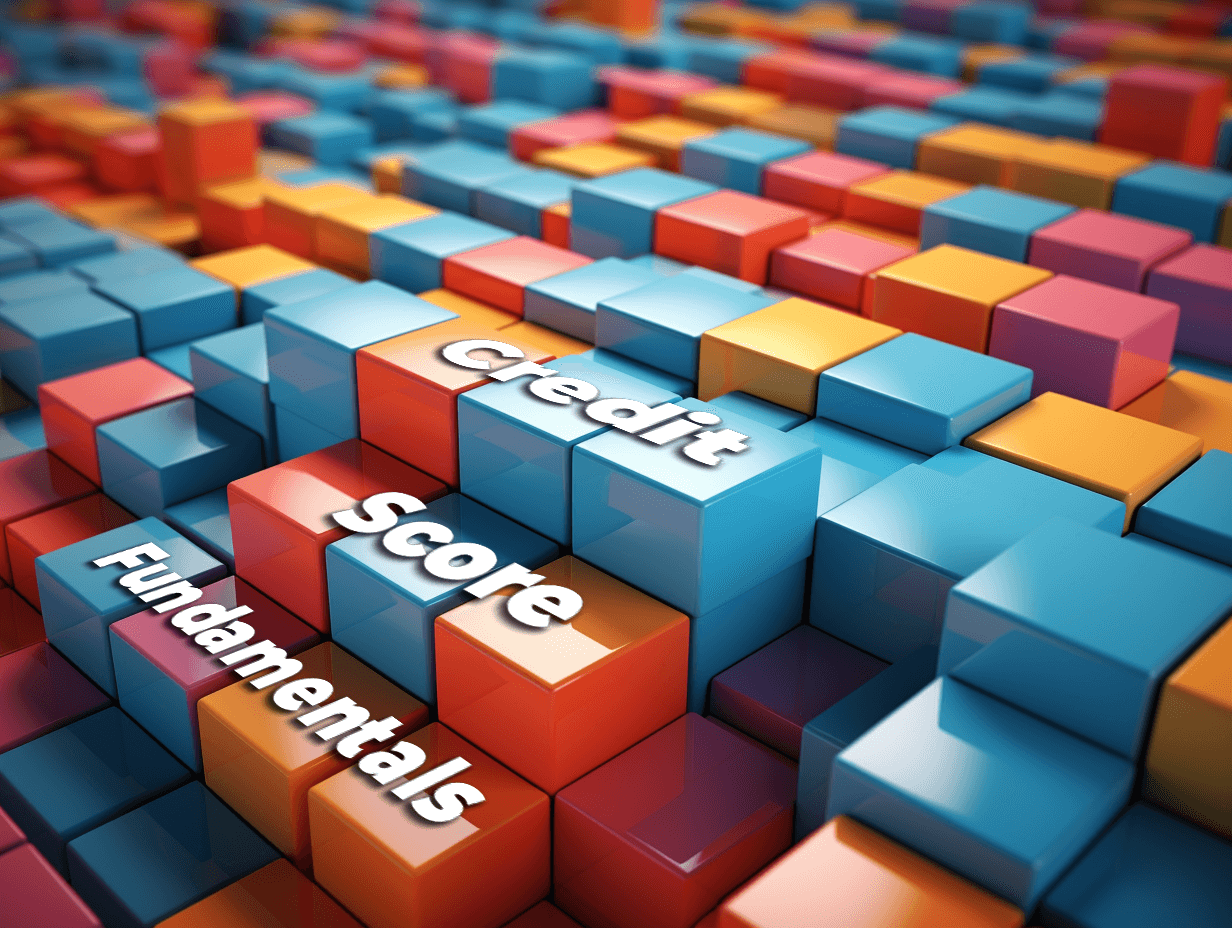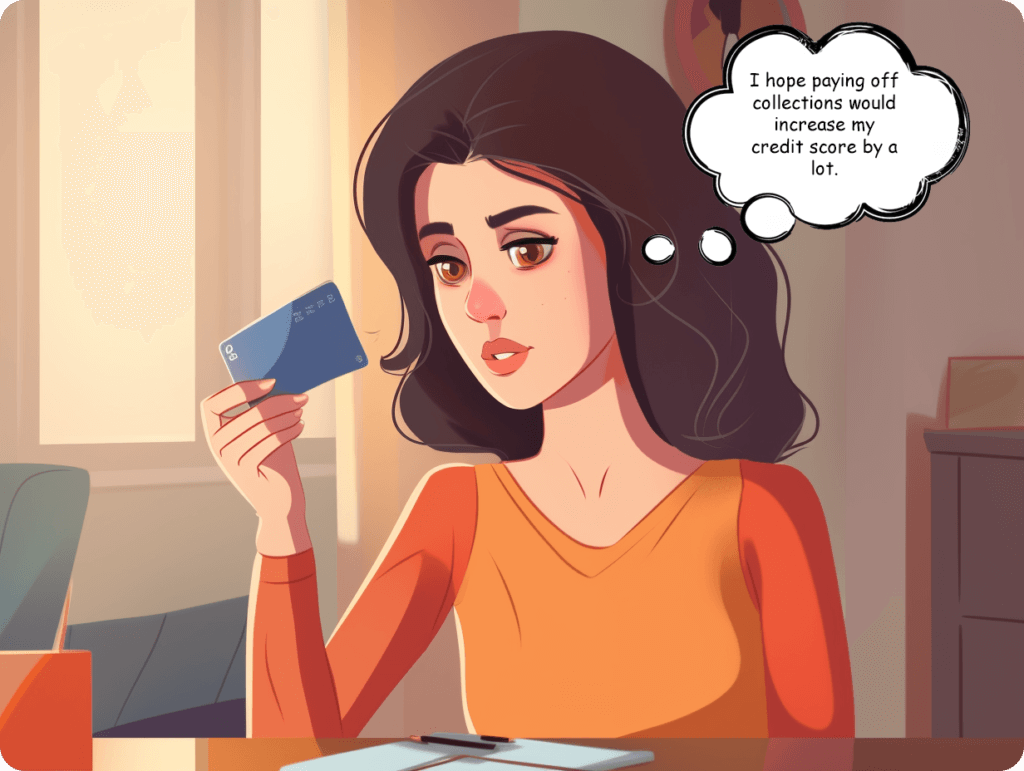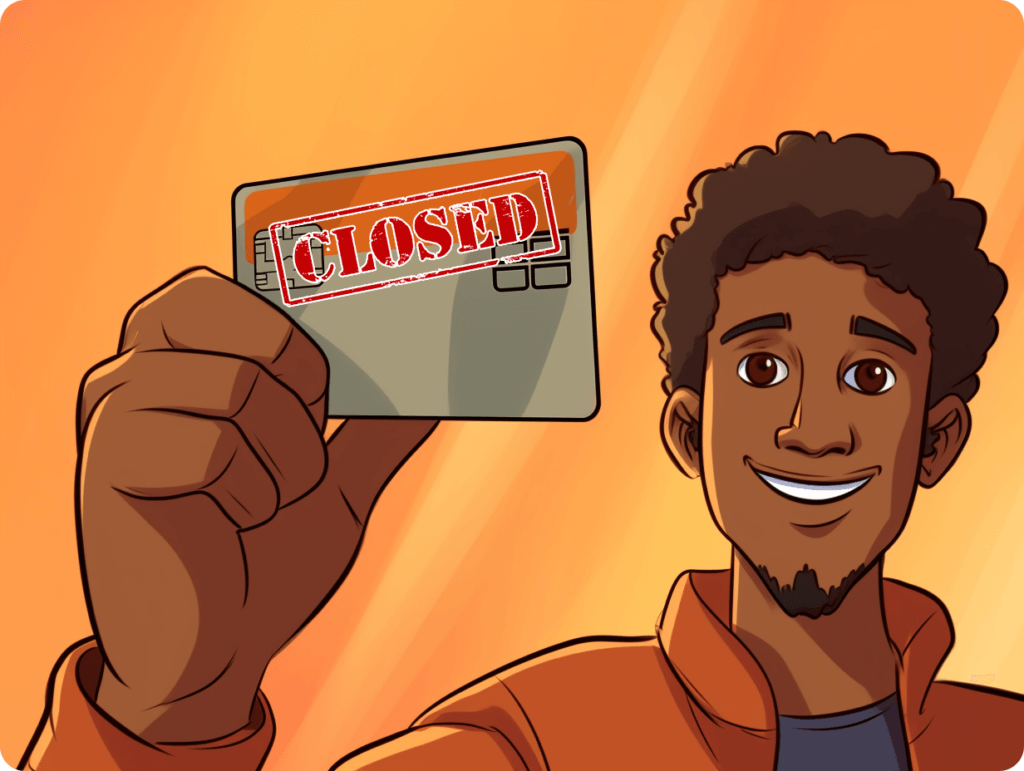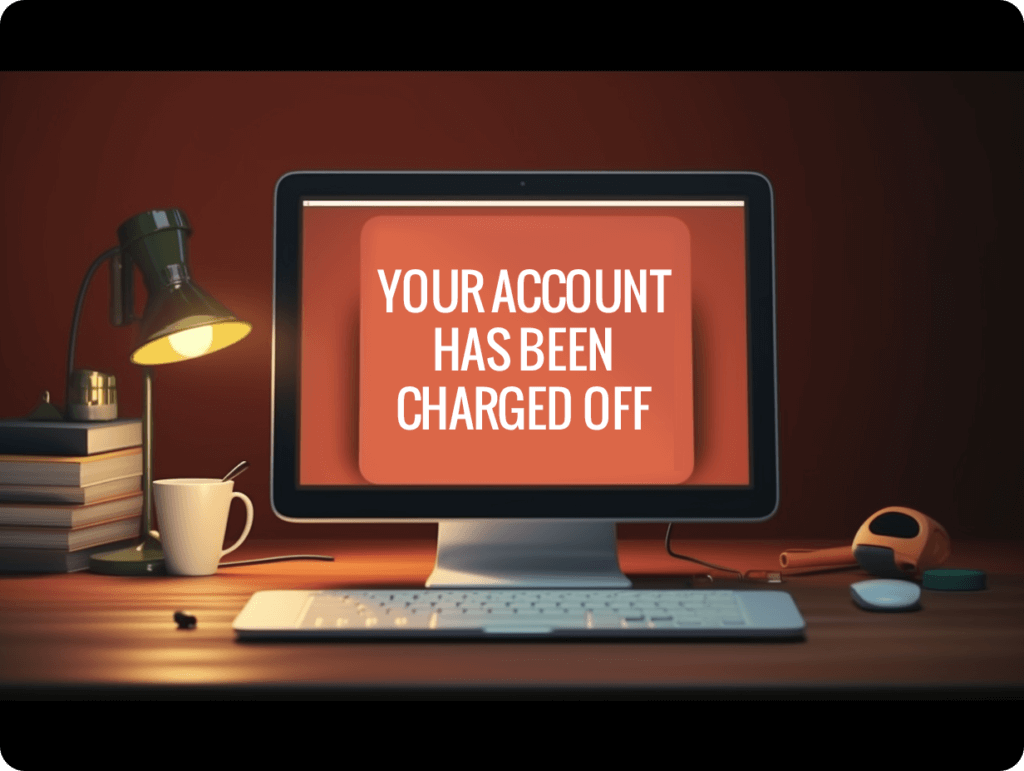- Blogs
- /
- How Many Points Will My Credit Score Increase When I Pay Off Collections?
How Many Points Will My Credit Score Increase When I Pay Off Collections?

Summary
The dreaded word “collections.” It hovers over your credit record like a rain cloud, threatening to dim your financial shine. And the burning question everyone has is, “Just how effective is a collection payoff?”
Understanding how paying off collections impacts your credit score is critical if you want to take control of your finances. We’ll be delving into the complex workings of credit scoring models and addressing the crucial question—how much will credit score increase after paying off collections?
We’ll refute online falsehoods quicker than a monster devours popcorn. This isn’t just about points. It’s about recovering your financial future, one conquered collection at a time. Read on to learn the elements that influence how much your credit score rises after paying off collections.
Key Takeaways
- Collection accounts result from unpaid bills or loans and harm creditworthiness. Unresolved collections portray borrowers as risky. Paying them off reflects financial responsibility and improves creditworthiness.
- Unpaid collections lower credit scores. Resolving collections is crucial to increasing scores and improving credit health.
- Payment history, credit utilization, and derogatory marks (like collection accounts) influence creditworthiness—timely payments and responsible credit utilization positively impact scores.
- Immediately paying off collections boosts credit scores by removing negative marks from reports. Long-term benefits include demonstrating responsible financial behavior and qualifying for better credit terms.
- The increase in credit scores after paying off collections varies based on factors. These include the number, severity, and age of collections.
- Debt settlement tactics are effective strategies to manage and improve credit health. Understanding consumer protections and setting up payment plans are also effective. Seeking professional assistance is another helpful strategy.
- Paying off collections improves credit utilization ratios. It also demonstrates financial stability to lenders. This increases their confidence in extending better credit opportunities.
- Collections typically stay on credit reports for seven years. However, their negative impact diminishes. Responsible financial habits gradually offset the adverse effects of collections on credit scores.
Credit Score Fundamentals

Collections and Credit Health
Unpaid collections lower your credit score. When you have a collection account, it means you’ve become severely delinquent on a debt. This negative mark stays on your credit report for up to seven years, dragging down your score. However, your credit score could increase once you pay off the collections.
Resolving collections is crucial for improving your credit health. It shows future lenders that you’ve taken responsibility for past debts. And you are trustworthy and can manage new lines of credit responsibly.
However, paying off collections doesn’t automatically remove them from your credit report. But it does show positive financial behavior.
Paying off collections can increase your credit score. It eliminates one major negative factor. Once the collection account is marked as “paid” or “settled,” its impact on your credit score decreases.
The more recent the collection activity is, the more significant its negative impact on your credit. Promptly resolving these issues can help boost your overall creditworthiness.
Understanding Collections Impact
1. Credit Score Variables
Various factors influence your credit score. Your payment history is crucial in determining your credit score. It includes on-time payments and any missed or late payments.
Your credit utilization also affects your score. It’s the amount of credit you use compared to the total available credit—the percentage of available credit you currently use. A low credit utilization ratio shows lenders you don’t rely too much on borrowed funds. It also shows that you can manage debt responsibly.
Finally, derogatory marks, like collection accounts and bankruptcies, can also impact your creditworthiness. These marks show past financial difficulties or unpaid debts. These negative items have a detrimental effect on your credit profile.
Understanding these variables is essential for managing your credit effectively. Focus on making timely payments. Keep your credit card balances low. Resolve any derogatory marks like collection accounts. Doing these can help you improve your credit score over time.
2. Collection Accounts Role
Collection accounts are created when individuals fail to pay medical bills or loans. An account enters collections after months of non-payment. It then gets reported to major credit bureaus. This negatively impacts the account holder’s credit scores.
Having collection accounts on file can significantly harm one’s creditworthiness. Lenders view individuals with unresolved collections negatively. They represent potential risk borrowers who might default again on future loan obligations.
Paying off collection accounts has the potential to help improve your creditworthiness. When an individual pays off a collection account through negotiations with creditors or settles for less than what was initially owed (“pay-for-delete”), this reflects positively on their financial responsibility.
Duration of Collections on Reports
Reporting Time Frame
Collections generally remain on your credit report for seven years. As collections age, their negative impact on your credit score tends to lessen. This means the initial hit to your credit score is the most significant. However, it diminishes over time. Yet, consistently maintaining good credit behavior is essential. It offsets the adverse effects of collections.
The impact of collections lessens as they age. Newer information holds more weight in determining your creditworthiness. As a result, older collection accounts have a smaller effect on your credit score than more recent ones. This indicates that even if you’ve had past financial challenges and accumulated collections, there’s still hope for improvement.
Consistently practicing responsible financial habits can help offset the adverse effects of collections on your credit score. Timely payments and positive credit activity show lenders that you are now managing your finances responsibly. This is true despite any previous setbacks.
Impact Diminishment Over Time
As mentioned, their impact on your credit score diminishes as collections age. Paying off a collection account won’t immediately remove it from your report. It also won’t drastically improve your score overnight. However, it does contribute positively over time.
Timely payments and positive credit activity are crucial. They outweigh the adverse history associated with collection accounts. For instance, timely payments on existing debts can rebuild trust with creditors. Keeping low balances relative to available credit can also help. This also raises one’s creditworthiness.
Responsible financial habits improve overall credit health. For example, avoiding late payments and not taking out unneeded loans.
Paying off collections has an immediate psychological benefit. It removes some stress associated with unpaid debt. However, its direct effect may take some time to be fully reflected in improved scores.
The Impact of Paying Off Collections
1. Immediate Effects
Paying off collections can have an immediate positive impact on your credit score. When you resolve collection accounts, they are typically removed from your credit report. This removal can lead to a boost in your credit score.
Lenders and creditors will no longer see these negative marks. This could increase your credit score. Eliminating collection accounts shows potential lenders that you are addressing past financial issues.
Resolving collections may also change how lenders view you as a borrower. Once you pay off the collections, lenders may consider you less of a risk. This can make qualifying for new lines of credit or loans easier. It will also make better terms and interest rates available to you.
2. Long-Term Benefits
The benefits of resolving collections extend beyond the immediate effects on your credit score. When future lenders review your credit history, it shows responsible financial behavior. You show you are committed to managing your finances by addressing and paying off old debts.
Over time, the negative impact of collections diminishes as they age on your credit report. A new positive payment history improves your credit health significantly. Older negative information fades, further boosting your credit health.
Addressing collection accounts helps boost your current credit standing. It sets the stage for long-term improvement in your financial profile.
In summary, by paying off collections successfully:
- Individuals prove their commitment to resolving past financial issues.
- Removing paid-off collections from their reports could lead to an immediate increase in their credit scores.
- It indicates positive changes in money management habits and reliability.
Credit Score Increase Expectations: How Much Will Credit Score Increase After Paying Off Collections?

1. Score Improvement Range
Paying off collections can lead to a varying increase in your credit score. It could significantly improve some people’s credit scores. However, others might see only a slight increase. The impact of paying off collections on your credit score is not uniform for everyone.
This credit score boost depends on several factors. These include the number and severity of the paid-off collections. Factors like the types of accounts, the amount owed, and how recent they are all play into this variation.
For instance, if you have many collection accounts or huge debts in collections, paying them off could substantially affect your credit score. It could affect it more than someone with fewer or smaller collection accounts.
Also, different credit scoring models may produce varying results when you pay off collections. It’s essential to consider this. One model may increase your credit score after settling these debts. Another model could reflect only a minor change.
2. Factors Affecting Increase
The age of the collection accounts plays a vital role in determining how much your credit score will increase after paying them off. Recent collections generally impact your overall credit health more than older ones. Paying off newer collection accounts will likely influence your credit score more than settling older ones.
Also, other positive financial behaviors contribute to an increased credit rating. Making consistent and timely payments on existing loans and lines of credit shows responsible financial management. It can help elevate your overall creditworthiness over time.
Keeping low balances relative to credit limits can further boost your credit. Avoid opening many new credit lines. This is especially true after paying off collections.
It’s essential for individuals aiming to improve their scores by addressing outstanding debt obligations, like those in collections, to recognize that it’s only one part of achieving better financial health. Regularly monitoring reports for errors or inaccuracies is also a crucial step.
Strategies for Credit Improvement
1. Debt Settlement Tactics
Negotiating a settlement with collectors is one effective way to handle debts. You can improve your credit score by settling for less than the balance.
However, obtaining written confirmation of any settlement agreements is crucial. This ensures both parties are clear on the terms and prevents misunderstandings later.
When negotiating a debt settlement, consider offering to pay a lump sum lower than the total amount owed. For example, if you owe $1,000, try proposing a payment of $500 in exchange for clearing the debt. This approach may help in reaching an agreement with the creditor or collector.
Another critical factor when dealing with collections is understanding your rights under the Fair Credit Reporting Act (FCRA). The FCRA protects consumers against inaccurate information reported by creditors and collection agencies. Understanding these rights can empower you during negotiations and ensure fair treatment.
2. Goodwill Negotiations
To request goodwill deletions from creditors, you appeal to their sense of fairness and understanding. When explaining your circumstances to them, be honest about what led to the collections account.
Emphasize your efforts in resolving it. Successful negotiations could improve credit scores. It could also make creditors remove negative items from your report.
Highlight any positive changes or responsible financial behavior since the collection occurred. For instance, if you experience temporary financial hardship due to medical bills. Talk about how you have consistently made payments on other accounts post-hardship.
This demonstrates responsible financial management and could support your case for goodwill deletion. Remember that not all creditors will entertain requests for goodwill deletions. But it’s still worth trying. Some may be willing to work with you based on individual circumstances.
How to Remove Collections from Reports
1. Dispute Process
If you find inaccurate or unfair collections on your credit report, you can dispute them. Write a letter to the credit bureaus, providing evidence of the error. If the collection is invalid, they will remove it from your report. This can increase your credit score. You are cleaning up your credit history by disputing and removing these collections.
Disputing collections is essential in improving your credit score. It directly addresses any inaccuracies that might be dragging down your score. For example, if a creditor reported a collection in error or was resolved but not updated on your report, disputing this information can lead to its removal and raise your credit score.
Submitting a dispute letter may seem like a small action. However, its impact on improving one’s financial standing can be substantial. Individuals with negative items on their reports need to understand that they have rights.
2. Goodwill Deletion
Another strategy for removing collections from your credit report involves requesting goodwill deletions from creditors. A goodwill deletion entails asking creditors to remove accurate but negative information. This is an act of goodwill. Successfully obtaining such deletions can increase your credit score.
Seeking goodwill deletions requires practical communication skills and persistence. Convincing creditors to remove valid negative information isn’t always easy. If successful, this approach could boost one’s credit rating.
Notably, seeking goodwill deletions may not always yield positive results immediately. But the potential benefits make it worthwhile for those looking to improve their financial standing.
Rights and Debt Negotiation
1. Consumer Protections
The Fair Debt Collection Practices Act protects consumers from unfair debt collection practices. Familiarize yourself with your rights under the FDCPA when dealing with collectors.
Understanding these protections can help you navigate the collection process. Collectors aren’t allowed to harass you. They also aren’t allowed to use deceptive tactics to collect a debt. For example, they cannot call you at unreasonable hours or use abusive language.
Knowing your rights means knowing what information collectors must provide about the debt they are trying to collect. This includes the amount owed and the original creditor’s name. It also explains how to dispute the debt if you believe there’s an error.
It is essential to be informed about these protections. It empowers you to interact with collectors. By knowing what is not allowed under the law, you can assert your rights when resolving collections on your credit report.
2. Settlement Options
When you have collections on your credit report, negotiating a payment plan with collectors can effectively resolve outstanding debts over time. Discuss a workable payment schedule that aligns with your financial situation. This way, you won’t put excessive strain on your budget.
Another option for settling collections is agreeing on a reduced lump sum payment. This is instead of paying off the total amount owed. This approach can allow you to clear the collection account for less than what you owe.
It is crucial to explore different settlement options based on your financial circumstances. This can help you find a resolution that works best for you. It can also address outstanding debts reported by creditors.
Managing Collections for Score Enhancement
1. Payment Plans
Setting up a payment plan for your collections can be a helpful strategy. Doing so can break down the total amount owed into smaller, more manageable payments.
This approach allows you to demonstrate responsible financial behavior by consistently making payments. For instance, you owe $1000 in collections. Setting up a payment plan shows commitment and responsibility. You could pay $200 monthly over five months.
Consistently making these payments over time positively affects your credit report. It may increase your credit score. Regular payments show creditors you are responsibly resolving your debts.
Completing the payment plan is an accomplishment. It could lead to positive changes in your credit history. Paying off the entire balance through the payment plan shows financial stability and discipline. These traits improve creditworthiness.
2. Professional Assistance
When dealing with collections, seek professional assistance from reputable sources. They can provide valuable guidance and support throughout this process. Credit counseling agencies and debt settlement companies offer such services.
Credit counseling agencies specialize in providing advice and education on managing personal finances. They also help people overcome debt-related challenges. They can help negotiate with creditors for individuals struggling with collections. They also offer budgeting strategies tailored to their circumstances.
Debt settlement companies assist individuals in negotiating settlements with their creditors. They aim to reduce the amount owed through negotiation tactics. However, it is crucial to thoroughly research any organization before seeking its services.
It’s essential to exercise caution when considering professional assistance. This is due to potential risks. The risks are associated with specific practices or unethical behaviors within the industry.
Conduct thorough research beforehand. This ensures that you engage only with trustworthy professionals. They should be genuinely interested in helping resolve your collection issues ethically.
Benefits of Settling Collections

1. Credit Utilization Impact
Paying off collections can significantly increase your credit score. Settling a collection account reduces the total amount of debt you owe. This, in turn, improves your credit utilization ratio. A lower utilization rate positively impacts your credit score.
Lowering your debt through settling collections can substantially improve your credit score. For example, if you have a credit card with a $5,000 limit and an outstanding balance of $2,500, that’s 50% utilization. But if you pay off a collection account and reduce that balance to $1,000, your utilization drops to 20%. This is considered favorable for boosting your credit score.
The general rule of thumb is to aim for a utilization rate below 30% for optimal results. By paying off collections, you reduce your debt load. This moves you closer to the ideal threshold. This improves the likelihood of significant increases in your credit score.
2. Financial Stability
Resolving collections demonstrates financial stability to lenders and creditors evaluating your creditworthiness. It indicates that you’ve taken steps to fix past difficulties or setbacks. You are managing debts responsibly despite them.
Lenders see you can address past delinquencies. They also see you can control any outstanding debts by paying off collections. This makes them confident in extending better credit opportunities to you. This could mean access to higher limits on new lines of credit. It could also mean access to loans with more favorable terms, such as lower interest rates.
Final Remark
Collections generally hurt your credit score. Paying them off can lead to an improvement. When you settle a collection account, it may show as “paid” or “settled” on your credit report. This can positively impact your credit score. It demonstrates that you’ve resolved an outstanding debt.
However, the increase in your credit score after paying off collections depends on various factors. Yes, it can undoubtedly increase your credit score, but the exact amount varies.
Paying off collections can help boost your credit score. But it might not result in a significant jump. Other negative items might also affect your credit report. If you have late payments or high debt, these factors could continue to weigh down your overall creditworthiness. This could happen even after resolving collections.
So, go ahead and put your newfound knowledge into action. Check your credit reports. Devise a plan to tackle any outstanding collections. Keep learning and growing on your journey to financial well-being.
FAQs
How does paying off collections affect my credit score?
Paying off collections can positively impact your credit score. It demonstrates responsible financial behavior and could gradually improve your credit score. However, the increase will vary depending on circumstances.
What strategies can I use to improve my credit after paying off collections?
After paying off collections, you can focus on maintaining timely payments. Keep credit card balances low and avoid new debt. Regularly check your credit report for errors and promptly address them. This is crucial for credit improvement.
Can I remove collections from my credit report?
If accurate, you cannot remove collections from your credit report before their reporting period expires. The typical reporting period is seven years. However, negotiating with the collection agency for a “pay-for-delete” agreement may result in its removal. But this approach isn’t always successful.
How long do collections stay on my credit report?
Collections typically remain on your credit report for seven years. This period starts on the date of the initial missed payment. That payment led to the account being sent to collections. As time passes, you build positive financial habits. Their impact on your score will diminish.
What are some benefits of settling collections?
Paying off collections can improve your financial well-being. It can also show responsible money management skills to potential lenders. This could enhance future opportunities for obtaining favorable terms. It could help when seeking new lines of credit or loans.
Our Latest Blogs:

ThisIsJohnWilliams
FREE Strategy Session to Fix Your Credit Blogs / Facebook Twitter Linkedin Instagram Share Summary Ever wondered about the...

ThisIsJohnWilliams

ThisIsJohnWilliams

ThisIsJohnWilliams

ThisIsJohnWilliams






